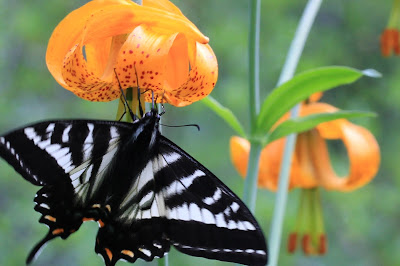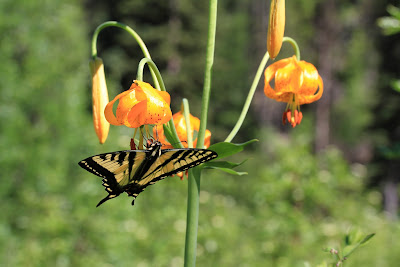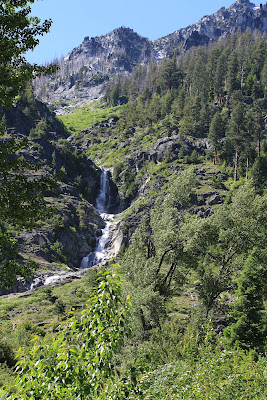Papilio eurymedon - Pale Swallowtail on Lilium columbianum - Columbia Lily on the Ingalls Creek Trail

We started out on July 1st with our first Northwest hike of the year. We escaped the gray of Seattle (the 4th of July was still several days away and everyone knows summer starts on the 4th in the Northwest) and headed east over the mountains to get us some sunshine. The hike was up Ingalls Creek in the Central Cascades. From the trailhead you hike more or less due west following the creek, sometimes close to it, and sometimes high above it, but always within earshot. We hiked about 6.1 miles in and then turned around. With lots of stops for picture taking and two stops to eat, we took 7.5 hours to cover about 12.3 miles in total. We left the trailhead at 11:45am and returned at 7:15pm.
The trail takes you to the base of the Enchantments to the north. About 6 miles in, we saw a waterfall coming down from the Enchantments. There is a nice mix of covered walking (out of the sun) and exposed-to-the-sun walking. It seems like the prime time for wildflowers on this trail might have been a few weeks ago, yet, there was still lots to see. Speaking of seeing: on the trail we encountered very few bugs and didn’t see any snakes. At least one group of hikers we saw said they heard and then saw a rattlesnake.
We titled this post “Butterflies and Balsamroot” because we were first, wowed by the number of butterflies we saw and, second, we had never seen arrowleaf balsamroot (Balsamorhiza sagittata) before. In terms of butterflies, we hopelessly tried to follow some to take a photos, but suddenly we would be standing next to a Columbia Lily (Lilium columbianum) and suddenly a butterfly would land on the lily and spend minutes feeding, inches from our face. Arrowleaf balsamroot really started to show up a couple of miles into the hike. Ironically, we didn’t see any butterflies feeding on balsamroot. The butterflies we encountered included Lorquin's Admiral (Limenitis lorquini), Lilac-Bordered Copper (Lycaena nivalis), Mourning Cloak (Nymphalis antiopa), Chryxus Arctic (Oeneis chryxus), Pale Swallowtail (Papilio eurymedon), Western Tiger Swallowtail (Papilio rutulus), and Northern Blue (Plebejus idas). Also, we were able to identify one moth, a White-striped Black (Trichodezia albovittata). Resources we used to help identify butterflies and moths include:
- Some of the Most Common Butterflies of the Pacific Northwest - a quick overview of some species.
- Butterflies and Moths of North America - a nice site where you can search by ventral and dorsal photos.
- Butterflies of America - a comprehensive but harder to use site; your best bet is to guess the family or genus and then open the page and scroll down through the images to find a match. For example, we guessed on the Mourning Cloak’s family Nymphalidae (Brushfoots) and then opened the very large family page and scanned the images.
- The Audubon Society Nature Guides Western Forests - an old standby book that covers the basics.
- Washington Native Plant Society Lists - has a vascular plant list for Ingalls Creek Trail.
- Turner Potographics - PNW Flowers - a site that makes it easy to search by family, genus, color, or flower type.
- Plants Of The Pacific Northwest Coast: Washington, Oregon, British Columbia & Alaska - an old standby that is comprehensive, easy to use, and has interesting information about plants.
Butterflies and Moths
Limenitis lorquini - Lorquin's Admiral
Lycaena nivalis - Lilac-Bordered Copper on Achillea millefolium - Yarrow

Nymphalis antiopa - Mourning Cloak [A very ragged specimen]
![Nymphalis antiopa - Mourning Cloak [A very ragged specimen] Nymphalis antiopa - Mourning Cloak [A very ragged specimen]](https://blogger.googleusercontent.com/img/b/R29vZ2xl/AVvXsEhuMTQ7kKM9Yh-MybojxWYZJSH7ttqLNt52vDuDKlgSd6gPkfohU3fzKA4BPRSVO4CMZoBmgwhKbb1g0n5H0pKAg5WYqhyphenhyphen-luJtrzwPWQ3Hb2P564Uq8tZTaT2JGJkpdbpnQASrHAN0Yos/s400/Butterfly+-+Nymphalis+antiopa+-+Mourning+Cloak+%255BA+very+ragged+specimen%255D.JPG)
Oeneis chryxus - Chryxus Arctic

Papilio eurymedon - Pale Swallowtail on Lilium columbianum - Columbia Lily

Papilio rutulus - Western Tiger Swallowtail on Lilium columbianum - Columbia Lily

Plebejus idas - Northern Blue [Ventral View] on Achillea millefolium - Yarrow
![Plebejus idas - Northern Blue [Ventral View] on Achillea millefolium - Yarrow Plebejus idas - Northern Blue [Ventral View] on Achillea millefolium - Yarrow](https://blogger.googleusercontent.com/img/b/R29vZ2xl/AVvXsEivBoMLxeLYE8gTFiVEO6eZjdSOUlLGkmY9iI9yg46QPAL20vlgmrhECxQS3F_EihHs8aN53giBNTu2Zr6-t2_26vSNi27TJnbHZno52JT6VjwnpyN2Vzjpx5_hgoO5w_8G7LokJsZsdgg/s400/Butterfly+-+Plebejus+idas+-+Northern+Blue+%255BVentral+View%255D.JPG)
Plebejus idas - Northern Blue [Dorsal View] on Achillea millefolium - Yarrow
![Plebejus idas - Northern Blue [Dorsal View] on Achillea millefolium - Yarrow Plebejus idas - Northern Blue [Dorsal View] on Achillea millefolium - Yarrow](https://blogger.googleusercontent.com/img/b/R29vZ2xl/AVvXsEhxoBxlA1rQxN96O93U8wNgVi8j-YnmZasrjoLwuNUsFB79tnOk9Y9k-M2fRHQB6TOVNEmFZHanfOjxJJ3xZvuiLALae3je0F2uuFi11NdFpIwb5M8OjNkp0tLLXqYoQwRI2rJBMHiFkqc/s400/Butterfly+-+Plebejus+idas+-+Northern+Blue.JPG)
Trichodezia albovittata - White-striped Black Moth

Ingalls Creek Trail Views
Ingalls Creek Trailhead
Ingalls Creek

A Waterfall Seen from Ingalls Creek Originating from Enchantments

Plants
[Asteraceae] - Anaphalis margaritacea - Pearly Everlasting![[Asteraceae] - Anaphalis margartacea - Pearly Everlasting [Asteraceae] - Anaphalis margartacea - Pearly Everlasting](https://blogger.googleusercontent.com/img/b/R29vZ2xl/AVvXsEiT9U9KjfWmLBV0mzj9Cj_DgvP5gLf2Tl1X_l__XefGC8M-Cy8N7QY6xrKzllk0w2SKUKBQg6lJqU0menuI7y4gUF6fqeeoKuzyr01-PdBddp2FB-Yp_phBrjCU4pgGL4oT3fQJYHDPXp0/s400/Plant+-+%255BAsteraceae%255D+-+Anaphalis+margartacea+-+Pearly+Everlasting..JPG)
[Asteraceae] - Balsamorhiza sagittata – Arrowleaf Balsamroot
![[Asteraceae] - Balsamorhiza sagittata – Arrowleaf Balsamroot [Asteraceae] - Balsamorhiza sagittata – Arrowleaf Balsamroot](https://blogger.googleusercontent.com/img/b/R29vZ2xl/AVvXsEh6kYwLWh_mByZgugdGWzFAm42LR1zClRvhKsZZE4GjDe59VMd8GmnVlMoz4c6-rEAgLqYZLwanD2biDuVDzQ2T-3PTkNvYnTfZCUwAhymT0LokOIPkak7vmG6atJdS5UJLoSPvgy8H3F4/s400/Plant+-+%255BAsteraceae%255D+-+Balsamorhiza+sagittata+-+Balsamroot.JPG)
[Asteraceae] - Cirsium edule - Edible Thistle
![[Asteraceae] - Cirsium edule - Edible Thistle [Asteraceae] - Cirsium edule - Edible Thistle](https://blogger.googleusercontent.com/img/b/R29vZ2xl/AVvXsEiXVh-pdkdSSyhOVU7LYJ6Mah3ZXgBOeEsCazm7x1lfHhBUCwWqChkMGEv5d5YFLHjKyc3NYsltauyIuyItcEflPmZHZyYdXmhLhxnDGrD2xkaTrAj2LuVXr3MhBvTH-JFu-sSg9KvyHw0/s400/Plant+-%255BAsteraceae%255D+-+Cirsium+edule+-+Edible+Thistle.JPG)
[Boraginaceae] - Mertensia paniculata – Tall Bluebells
![[Boraginaceae] - Mertensia paniculata – Tall Bluebells [Boraginaceae] - Mertensia paniculata – Tall Bluebells](https://blogger.googleusercontent.com/img/b/R29vZ2xl/AVvXsEi9HwCZMEQM9hycHyOaehQ2rs4uoYutQILy7ROs_2Ql21LXwct5ColAojSNj9igJXt-XGjrt3q6bpEPRCMxOnvHj3OQPbC7BWZj2uXwHRjq0bZGR_jTXRAT0KoCZg5b52vgvamGDoJJQ6c/s400/Plant+-+%255BBoraginaceae%255D+-+Mertensia+paniculata.JPG)
[Caprifoliaceae] - Lonicera ciliosa - Orange Honeysuckle
![[Caprifoliaceae] - Lonicera ciliosa - Orange Honeysuckle [Caprifoliaceae] - Lonicera ciliosa - Orange Honeysuckle](https://blogger.googleusercontent.com/img/b/R29vZ2xl/AVvXsEibB2SmoZr9jPEuhphGNyPVUQeBjzaonWWbIPJgjezqhdjV54wfGPWpYbsMxsaWJTId6UtJCVtfbiT-o3O0FRu7tixxhs5_jrhR1hDmhwY7-Ax-4SXdI7BEtFy5NUpHJe95McEzn6_hoME/s400/Plant+-+%255BCaprifoliaceae%255D+-+Lonicera+ciliosa+-+Orange+Honeysuckle+1.JPG)
[Caprifoliaceae] - Lonicera ciliosa - Orange Honeysuckle
![[Caprifoliaceae] - Lonicera ciliosa - Orange Honeysuckle [Caprifoliaceae] - Lonicera ciliosa - Orange Honeysuckle](https://blogger.googleusercontent.com/img/b/R29vZ2xl/AVvXsEjhbeh9L6D9klxK7GyZ3IvkeoficPir-j74uQAgYfZb1KRkWB_MLC5-0LUjsgM92ZKiQ9Z1yq8sXSicooJpTyfGTej8_QHbQuoMp9OxygRqMdcrlQYvxfopUoL6EpyVVXBw6EMebqtU4C0/s400/Plant+-+%255BCaprifoliaceae%255D+-+Lonicera+ciliosa+-+Orange+Honeysuckle+2.JPG)
[Caprifoliaceae] - Lonicera involucrata - Black Twinberry
![[Caprifoliaceae] - Lonicera involucrata - Black Twinberry [Caprifoliaceae] - Lonicera involucrata - Black Twinberry](https://blogger.googleusercontent.com/img/b/R29vZ2xl/AVvXsEgSW_S2j_kp_2Aw_PpEdI54kLy4YUFlpQlwlEHYsxloye7FekyWRRNE0rbld5VMYsl8HQlBbTpzSVg6b2r5qaOAhxoipKajrUjDM7qzry8XWXjYSPzRb2fazqboBrhA0fr7rRCvjn9Lhbo/s400/Plant+-+%255BCaprifoliaceae%255D+-+Lonicera+involucrata+-+Black+Twinberry.JPG)
[Cyperaceae] - Carex
![[Cyperaceae] - Carex [Cyperaceae] - Carex](https://blogger.googleusercontent.com/img/b/R29vZ2xl/AVvXsEhdAv2MsfndoFFZxGOhYN7QqOXog61QYTnxvQ_wUgcVklKE_TU8rfhMXBPqLpkXpJRl9dlEYbOFjy0yPwvPnGyatArjZ7O-SrSWqcp0pcc3yTmEvud9pVciBn37MzeFldeXoPlfZaUJc20/s400/Plant+-+%255BCyperaceae%255D+-+Carex.JPG)
[Ericaceae] - Chimaphila umbellata - Prince's Pine Seed Capsules
![[Ericaceae] - Chimaphila umbellata - Prince's Pine [Ericaceae] - Chimaphila umbellata - Prince's Pine](https://blogger.googleusercontent.com/img/b/R29vZ2xl/AVvXsEgpoMXS9Pbeati2irDWjNgMCbPc4AgZCcTN6ft7UZEcVbHZRbXqsqUHgfQcSW4mB7RIGnSxrAp0yIxTmMQ9L8olQyUUPNCDbEALDwOdGtIlEOi6Wctlp9bsGpu3rlsoG-yGJg0SdM3IZ6c/s400/Plant+-+%255BEricaceae%255D+-+Chimaphila+umbellata+-+Prince%2527s+Pine+1.JPG)
[Ericaceae] - Chimaphila umbellata - Prince's Pine
![[Ericaceae] - Chimaphila umbellata - Prince's Pine [Ericaceae] - Chimaphila umbellata - Prince's Pine](https://blogger.googleusercontent.com/img/b/R29vZ2xl/AVvXsEiEIRmZZg539rNDgp0bsSAl9A0hr782W9dXjgWJ0WE157dJg-BaNY8khE9xc4fSgP6F3slCNSACA056vjE9N9GZINEmJWSBljVMyTWhNPUHg7sh2ldI9hBTFODzFyrm_QB8liGZwP7sW9I/s400/Plant+-+%255BEricaceae%255D+-+Chimaphila+umbellata+-+Prince%2527s+Pine+2.JPG)
[Ericaceae] - Pyrola picta - White-veined Wintergreen
![[Ericaceae] - Pyrola picta - White-veined Wintergreen [Ericaceae] - Pyrola picta - White-veined Wintergreen](https://blogger.googleusercontent.com/img/b/R29vZ2xl/AVvXsEg0NJTyqKjd5Xn4D-uXeNXBnjM9BxLqrW_UToonwSOIMiouBYp6eHcDV9nLCSSJEG6tfXCBqggLkLuAJhJi0y7xAiDdFjK6rlRuXsokemDvjYFjCOiNX0BQjP6oWrPe742691uMALn0A64/s400/Plant+-+%255BEricaceae%255D+-+Pyrola+picta+-+White-veined+Wintergreen.JPG)
[Lilaceae] - Clintonia uniflora - Queen's Cup
![[Lilaceae] - Clintonia uniflora - Queen's Cup [Lilaceae] - Clintonia uniflora - Queen's Cup](https://blogger.googleusercontent.com/img/b/R29vZ2xl/AVvXsEhO72vnYIvrzjvJrKzhIz_Khwsp-4-eVfT-053jwf3LNNFqh4iWQUcamsRNVYIS3ws8sZsF5ieej1TcWhiSDsa9RqKkHUqxZLC2puv9dMIxOzterrPkBOLwvMX6bInn4Vv5K1wsTkmf7HU/s400/Plant+-+%255BLilaceae%255D+-+Clintonia+uniflora+-+Queen%2527s+Cup.JPG)
[Lilaceae] - Prosartes hookeri - Hooker's Fairy Bells
![[Lilaceae] - Prosartes hookeri - Hooker's Fairy Bells [Lilaceae] - Prosartes hookeri - Hooker's Fairy Bells](https://blogger.googleusercontent.com/img/b/R29vZ2xl/AVvXsEisMbd3YDV8ZQdF6ywW54A-MdRWHHvoIdl3FyOnQIrEo0Se7DkW02rLfj-iV0ZFspxt3aiJYyoc1xPB37UPFWdAmWyon2JdRT8VJAOjrXHn5TIGXnkKYj0wTURaU8LJKpKJK3s2-7_BGS8/s400/Plant+-+%255BLilaceae%255D+-+Prosartes+hookeri+-+Hooker%2527s+Fairy+Bells.JPG)
[Liliaceae] - Allium acuminatum - Hooker's Onion
![[Liliaceae] - Allium acuminatum - Hooker's Onion [Liliaceae] - Allium acuminatum - Hooker's Onion](https://blogger.googleusercontent.com/img/b/R29vZ2xl/AVvXsEgSQcZe4iAahXmjNcLXtUeo_UUxEvOaMpX94s2vvsXKyjYtDe_tXm1k2AvrG9NTgW-ECN4SmwAX2Uf-hsFdDOkhPE23aXhmX1ba759jB8aZs5iedEGFHBgdNT6IORzYOr7IQIJAsFqhTg4/s400/Plant+-+%255BLiliaceae%255D+-+Allium+acuminatum+-+Hooker%2527s+Onion.JPG)
[Liliaceae] - Calochortus lyallii - Lyall's Star Tulip, Mariposa Lily
![[Liliaceae] - Calochortus lyallii - Lyall's Star Tulip, Mariposoa Lily [Liliaceae] - Calochortus lyallii - Lyall's Star Tulip, Mariposoa Lily](https://blogger.googleusercontent.com/img/b/R29vZ2xl/AVvXsEjbY1BKWNwB90lDDPbjLEVt5HE60_thXV0pbiUlnonBTGfSesvwqU6Hlt6W7_hhEshVDc5j-ynhgneE5VbCd61NpkwHpN2nFVFZP6Y1SguAI1hE3wPqceulGKH1rNUYOYnb7FU9umD8fA4/s400/Plant+-+%255BLiliaceae%255D+-+Calochortus+lyallii+-+Lyall%2527s+Star+Tulip+1.JPG)
[Liliaceae] - Calochortus lyallii - Lyall's Star Tulip, Mariposoa Lily
![[Liliaceae] - Calochortus lyallii - Lyall's Star Tulip, Mariposoa Lily [Liliaceae] - Calochortus lyallii - Lyall's Star Tulip, Mariposoa Lily](https://blogger.googleusercontent.com/img/b/R29vZ2xl/AVvXsEgRkzf9PfsMQ-zUJ4hpKAHnnCtDX-qe3kFdOFSIXhefCpijiwJUemYmkxb-EpMgzFzKRGXMpWr48Xco7kXcInIGIiv9R8ahuabbwX3UxmAow0zGFvSTkF0JylIm6isMQD1Cp7jsBXNTjZk/s400/Plant+-+%255BLiliaceae%255D+-+Calochortus+lyallii+-+Lyall%2527s+Star+Tulip+2.JPG)
[Liliaceae] - Lilium columbianum - Columbia Lily
![[Liliaceae] - Lilium columbianum - Columbia Lily [Liliaceae] - Lilium columbianum - Columbia Lily](https://blogger.googleusercontent.com/img/b/R29vZ2xl/AVvXsEg16YNArymf69fZ5CQ9BCwf4S2gy6usMIDNQS_FrJ832pZH8992Rg48V2_t0aWhiH7mntMK0yINmGRMlUMTClB50Pr7BriVRyxBt8tftDx-PWqZql4KLsXqMkkbJ4C2Lim3gUbNoOMiZRY/s400/Plant+-+%255BLiliaceae%255D+-+Lilium+columbianum+-+Columbia+Lily.JPG)
[Orchidaceae] - Corallorhiza maculata - Western Coralroot
![[Orchidaceae] - Corallorhiza maculata - Western Coralroot [Orchidaceae] - Corallorhiza maculata - Western Coralroot](https://blogger.googleusercontent.com/img/b/R29vZ2xl/AVvXsEiM2aboyPqPTm7jEoxfBLP0TWrKkN6HKkTkFnENByWAkirsoQE12z7tOwFhOfXeJ_QohdhkCYWz4iGyDcOZDKl8AFsnhG3bcks8RzDEyJuvB7FgDJLSmPtmZpZqMitZD4ulwxun0nhqVw4/s400/Plant+-+%255BOrchidaceae%255D+-+Corallorhiza+maculata+ssp.+-+Western+Coralroot+1.JPG)
[Orchidaceae] - Corallorhiza maculata - Western Coralroot
![[Orchidaceae] - Corallorhiza maculata - Western Coralroot [Orchidaceae] - Corallorhiza maculata - Western Coralroot](https://blogger.googleusercontent.com/img/b/R29vZ2xl/AVvXsEiCqwvSc8c3ABuVdSBfTob6qOPea0aD1l41p1tRvhT2PQ-oymTMWEs3vYYM0Hulk0kgzB-I2z2oMerDMj0INZKEvxQ7URWh3hEOhqmoUE4jkJ6HyVDxhF3XsLwn0Jwkw8L0fyiUqefVPFQ/s400/Plant+-+%255BOrchidaceae%255D+-+Corallorhiza+maculata+ssp.+-+Western+Coralroot+2.JPG)
[Orchidaceae] - Cypripedium montanum - Mountain Lady’s Slipper
![[Orchidaceae] - Cypripedium montanum - Mountain Lady’s Slipper [Orchidaceae] - Cypripedium montanum - Mountain Lady’s Slipper](https://blogger.googleusercontent.com/img/b/R29vZ2xl/AVvXsEiRTzRa7Lo1xVBX0NVub1TVzyWHfu0F4Y1jhEGyygOm_4GFRovpjmKQEfA_duu7t-H1ozUtwar9kJfr-tVau7qZET4GMSPC3-MlkA9gXeRJRUNfjwDwLcbVmfbInIYDGsZ-nNVHHdOmfqo/s400/Plant+-+%255BOrchidaceae%255D+-+Cypripedium+montanum+-+Mountain+Ladyslipper+1.JPG)
[Orchidaceae] - Cypripedium montanum - Mountain Lady’s Slipper
![[Orchidaceae] - Cypripedium montanum - Mountain Lady’s Slipper [Orchidaceae] - Cypripedium montanum - Mountain Lady’s Slipper](https://blogger.googleusercontent.com/img/b/R29vZ2xl/AVvXsEjjgehy6kjf2RqDRmIqF1FBzdTmgzZiMALD5J3WgU9VbOda4QwvVqR1mfiSuUvo4oXHWSqSkrGgWgd9e4bhiXjOp9ioFS-zgft15E_XGODaiJwR9jWJtDfj6u8v9h8kMjK0hyphenhyphenX3zElNlCE/s400/Plant+-+%255BOrchidaceae%255D+-+Cypripedium+montanum+-+Mountain+Ladyslipper+2.JPG)
[Orchidaceae] - Goodyera oblongifolia - Rattlesnake-Plaintain – Bloom Spike
![[Orchidaceae] - Goodyera oblongifolia - Rattlesnake-Plaintain [Orchidaceae] - Goodyera oblongifolia - Rattlesnake-Plaintain](https://blogger.googleusercontent.com/img/b/R29vZ2xl/AVvXsEjpWVJ_6EJwacVH83ox9K98mmWQsr3X4Ta50Dp1pLYKbo1ZsgjVXzOWxyu72NPk0xP5fojVQ_GgUNHlNkT3iyi8W5otVtZ9vP-tXxICi80HuEa6y80MkFj2OzMJuXsU4jG7sRLNVELh2zU/s400/Plant+-+%255BOrchidaceae%255D+-+Goodyera+oblongifolia+-+Rattlesnake-Plaintain.JPG)
[Plantaginaceae] - Penstemon procerus - Littleflower Penstemon
![[Plantaginaceae] - Penstemon procerus - Littleflower Penstemon [Plantaginaceae] - Penstemon procerus - Littleflower Penstemon](https://blogger.googleusercontent.com/img/b/R29vZ2xl/AVvXsEjtHXhIE62vpvqnJ9nj1-l6c4kdbaNjwTVF4_jF9lfMueiKbyAyhZRkKH08DFL2dDZEcqfSV5arvK88a7tup_K8GYrv43RjczIk8KqT1NNb2y4h_r5S_CtjifvwqTRCXSFU0h1yit2NWvQ/s400/Plant+-+%255BPlantaginaceae%255D+-+Penstemon+procerus+-+Littleflower+Penstemon.JPG)
[Ranuculaceae] - Actaea rubra - Baneberry
![[Ranuculaceae] - Actaea rubra - Baneberry [Ranuculaceae] - Actaea rubra - Baneberry](https://blogger.googleusercontent.com/img/b/R29vZ2xl/AVvXsEjBtAJ76WwI79fWUPctbJqQ5inQZIFzjdxke3WhzDg_hIcGZFE2TTzrV404uFSzzCsbdSdE7kZ2QK_iRl17o1FXLtK206tR_RkQKgdLfRy1Yx2fSuffVQPgHI4YogBc4RpDMerzdT5W_5E/s400/Plant+-+%255BRanuculaceae%255D+-+Actaea+rubra+-+Baneberry.JPG)
[Ranuculaceae] - Aquilegia formosa - Red Columbine
![[Ranuculaceae] - Aquilegia formosa - Red Columbine [Ranuculaceae] - Aquilegia formosa - Red Columbine](https://blogger.googleusercontent.com/img/b/R29vZ2xl/AVvXsEgSOIaIOkXs34wKIAkUb_Us95YqnlmaMQR2DnoWoJeyoZciQzgqqXoNHlt3txMsTwrhxPiSrrSPesPx9SBhc3rqnD5vnaYlpfhNEN9kAVZ2Kv8OZCtX3WYD0wYaYUeLVM0FL3NMcyyij78/s400/Plant+-+%255BRanuculaceae%255D+-+Aquilegia+formosa+-+Red+Columbine.JPG)
[Ranuculaceae] - Delphinium multiplex - Kittitas Larkspur
![[Ranuculaceae] - Delphinium multiplex - Kittitas Larkspur [Ranuculaceae] - Delphinium multiplex - Kittitas Larkspur](https://blogger.googleusercontent.com/img/b/R29vZ2xl/AVvXsEgOztmiFXyqMXsN0e6F7G0uaezSxdKw6qGdBPyJvhRlP5VCZSQbFVss_GOMMDdCNJ4YkIu1OZ0fmb2w-d_Xb0ptIyP4EpOUn6R8l8qu9xIJauf5LKS6eJ-Z_QDUz1zTiPeKlSUQoOVdUXw/s400/Plant+-+%255BRanuculaceae%255D+-+Delphinium+multiplex+-+Kittitas+Larkspur.JPG)
[Ranuculaceae] - Thalictrum occidentalis - Western Meadow Rue
![[Ranuculaceae] - Thalictrum occidentalis - Western Meadow Rue [Ranuculaceae] - Thalictrum occidentalis - Western Meadow Rue](https://blogger.googleusercontent.com/img/b/R29vZ2xl/AVvXsEgf2ZgzIyqKx4_LGtiN_S5mTY5yare18eexBsrpcoGI3q9vWT_fPixlQfO2VBUCYLWFhcT8j6D5gxVWxMrJNVT9NDxiAeocd9MAb9v6WxSLF5i4G5UN2BoOh1d1yueDFx_AP7KvzeO6yRY/s400/Plant+-+%255BRanuculaceae%255D+-+Thalictrum+occidentalis+-++Western+Meadow+Rue.JPG)
[Ranuculaceae] - Trautvetteria caroliniensis - False Bugbane (?)
![[Ranuculaceae] - Trautvetteria caroliniensis - False Bugbane [Ranuculaceae] - Trautvetteria caroliniensis - False Bugbane](https://blogger.googleusercontent.com/img/b/R29vZ2xl/AVvXsEgJ31BOmFW9XGavJSER80Pj5IkE5uG6ekiIbTkPcy7S5WjKMCxlVUq3ScLtLDNdjxBq2L8AG5DaabibaxRzKmUVMF62Qv2VsmKA29uhwowP9FnY-HhnB6aMYtPbZx7LdBTN2hbQqfB1RRk/s400/Plant+-+%255BRanuculaceae%255D+-+Trautvetteria+caroliniensis+-+False+Bugbane.JPG)
[Rosaceae] - Rosa nutkana - Nootka Rose in Shadow
![[Rosaceae] - Rosa nutkana - Nootka Rose in Shadow [Rosaceae] - Rosa nutkana - Nootka Rose in Shadow](https://blogger.googleusercontent.com/img/b/R29vZ2xl/AVvXsEheNjxnZZVOGHFS54YqfETyroA3smp4MuTFGpzINKH279KmGYSxwicARLGYX6nTHrwlg9fjKP8a_zOqo-oP3AHLBMuDEn1x2-69c1L8SDP-n5QkwB-ZtjBED7UufwDA-S-AUj2bePrJ0Ds/s400/Plant+-+%255BRosa%255D+-+Rosa+nutkana+-+Nootka+Rose+1.JPG)
[Rosaceae] - Rosa nutkana - Nootka Rose with Holes
![[Rosaceae] - Rosa nutkana - Nootka Rose with Holes [Rosaceae] - Rosa nutkana - Nootka Rose with Holes](https://blogger.googleusercontent.com/img/b/R29vZ2xl/AVvXsEgFw70OEzy4gzvmDFPO96H24nig3IOWLz7irqV_n15MqAPdqJhzVZjf-DgG8L3ontXjyQ0HD0ZvN1-nOmZWsA9xR68E_6Mg-GU1WRr8bCopaif6QVhEOS5RoObvRmyW5onEdgGrFIaDoGQ/s400/Plant+-+%255BRosa%255D+-+Rosa+nutkana+-+Nootka+Rose+2.JPG)
[Rosaceae] - Spiraea densiflora - Subapline spiraea (?)
![[Rosaceae] - Spiraea densiflora - Subapline spiraea [Rosaceae] - Spiraea densiflora - Subapline spiraea](https://blogger.googleusercontent.com/img/b/R29vZ2xl/AVvXsEgVKNLYfFuCs9UAY3ToZGwH7VVbcz9yBGge2gWe7b13wgNa1ld9NjrJJJRKAasPvqOKhDL5oH-ILIsIq6nqtOL335qIDMDVZl7HK85tFGJQWpY6MZttYEgtxpsL6PMMQSA5KHq4SXsnrrM/s400/Plant+-+%255BRosa%255D+-+Spiraea+densiflora+-+Subapline+spiraea.JPG)
[Rosaceae] - Geum macrophyllum - Large-Leaved Avens
![[Rosaceae] - Geum macrophyllum - Large-Leaved Avens [Rosaceae] - Geum macrophyllum - Large-Leaved Avens](https://blogger.googleusercontent.com/img/b/R29vZ2xl/AVvXsEgcbop9ZY4QhYDOYHzOiIBQD47DyPHZ5Yi06jL-tulIldr5O7BQlOQoTFKK8bZmZTINsxRRBHyrGw-iVaU0ICjo8R1gx4NkOyeTwGwLam2qE4On_yDcQ_BtZjk_LQY9P11uy7NlIZkGZ7Q/s400/Plant+-+%255BRosaceae%255D+-+Geum+macrophyllum+-+Large-Leaved+Avens.JPG)
[Scrophulariaceae] - Castilleja spp. red
![[Scrophulariaceae] - Castilleja spp. red [Scrophulariaceae] - Castilleja spp. red](https://blogger.googleusercontent.com/img/b/R29vZ2xl/AVvXsEiYuTxCX82mn3vWT1wHtFzrpNJfgzHaHm9oo0d3SfdyzBU-m2OoQxR3NglVPXiLxLPg2M5YXHIaBUi1mypWhI1-bsHHVT2xQQI8DW-m0XnR8SfAz7v1Cngu_mN2b_FEtQA1jVCgEcsoS0I/s400/Plant+-+%255BScrophulariaceae%255D+-+Castilleja+spp.+red.JPG)
[Scrophulariaceae] - Castilleja spp. yellow
![[Scrophulariaceae] - Castilleja spp. yellow [Scrophulariaceae] - Castilleja spp. yellow](https://blogger.googleusercontent.com/img/b/R29vZ2xl/AVvXsEhKnTOevPFmqEKsYz6Ji8VSUWUPH1b4Zpj8KHSKcDIkbsNzQAB2LZ7mwMmUvakrQ9LFDUfo6DKk4v9wLWKjCZKRSmEKwT3F8e9feLqLx791vZX1GJhNorJGenLTe8iXPqSMxgdK_U9TLeM/s400/Plant+-+%255BScrophulariaceae%255D+-+Castilleja+spp.+yellow.JPG)
[Scrophulariaceae] - Mimulus guttatus - Yellow Monkey-Flower
![[Scrophulariaceae] - Mimulus guttatus - Yellow Monkey-Flower [Scrophulariaceae] - Mimulus guttatus - Yellow Monkey-Flower](https://blogger.googleusercontent.com/img/b/R29vZ2xl/AVvXsEhmB_WxitgclwK1_Ezg7-dSw6p79Mdci2oM-SXpPWn4_-DDsi0ZOxyp2xQa9St1EVkyHHidHuZEbRs-3wst5Ga2fatycWtrTiy_d_GXa_IcZBi4P5ez-WitWHuuW7VRAsDNwHqujtzmuS4/s400/Plant+-+%255BScrophulariaceae%255D+-+Mimulus+guttatus+-+Yellow+Monkey-Flower.JPG)
No comments:
Post a Comment
All comments are moderated. If your comment doesn't appear right away, it was likely accepted. Check back in a day if you asked a question.